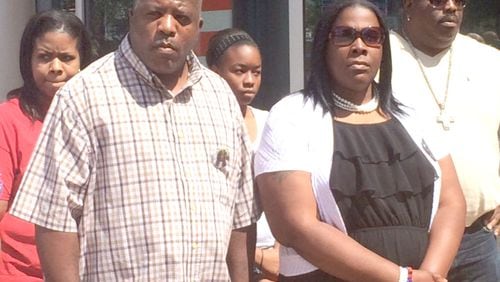More than three years after Kendrick Johnson's body was found in a rolled-up gymnastics mat, perhaps the only people without a firm opinion about what happened to the Valdosta teen are the investigators who've studied the case the longest.
“After extensive investigation into this tragic event, federal investigators determined that there is insufficient evidence to prove beyond a reasonable doubt that someone or some group of people willfully violated Kendrick Johnson’s civil rights or committed any other prosecutable federal crime,” a statement from the Justice Department said Monday.
The federal probe into Johnson’s death, initiated in October 2013 by the former U.S. Attorney for the Middle District of Georgia, Michael Moore, involved lawyers and investigators from the Justice Department, District of Columbia police officers, U.S. marshals and the FBI. Nearly 100 interviews were conducted and, according to the Justice Department’s statement, “tens of thousands” emails and text messages were reviewed, along with surveillance videos from Lowndes High School, where Johnson’s body was discovered on Jan. 11, 2013.
In the end, acting U.S. Attorney Carole Rendon acknowledged that prosecutors were unable to provide “definitive answers about Kendrick’s tragic death.”
It was a result that pleased no one.
“They couldn’t tell us what happened,” said Kendrick’s mother, Jackie Johnson. “They know something happened, but they couldn’t prove it.”
Kenneth Johnson, Kendrick’s father, said prosecutors “confirmed our belief that something happened to Kendrick.”
But federal authorities offered no specifics. They refused to face reporters, issuing only the statement confirming the case was closed.
The Johnsons have insisted all along that their son was killed, even after local and state law enforcement officials ruled his death an accident. Moore also seemed convinced that foul play was involved, sending letters to Lowndes High students Brian and Branden Bell informing them they were targets of his investigation.
But even after the Bell brothers produced alibis backed up by witnesses and video surveillance footage, heavily armed U.S. marshals conducted military-style raids at Brian's dorm room at the University of Akron, Ohio, and Branden's Valdosta apartment. Search warrants were also served on their parents, Brian's girlfriend and her parents.
Read the AJC’s TWO-PART SERIES ON THE JOHNSON CASE: Evidence or innuendo?
“It is a tragedy that the federal government under this administration spent all this money and time and manpower on a hoax,” said Karen Bell, Brian and Branden’s mother. She said the family had spent more than $215,000 on attorney fees to defend themselves against civil lawsuits filed by the Johnsons and deal with the federal investigation.
It’s unknown how much that investigation cost. Valdosta civil rights leaders say the federal probe did nothing but exacerbate racial tensions in the south Georgia city. Those who think Johnson was murdered are resolute, and the Justice Department’s decision only seemed to reaffirm their belief that the system is stacked against young African-American men like Kendrick Johnson.
“It’s what we expected,” said Andrew Joseph, who identified himself as a spokesman for the Johnsons.
The Johnsons announced Monday they plan to refile lawsuits against the Bells, state and local law enforcement, school officials and the state medical examiner’s office. Countersuits by the Bells await a judge’s ruling.
Meanwhile, the questions outlined by former U.S. Attorney Moore when he opened the investigation — what was the cause of death, was it the result of a crime, if so, who was responsible — remain.
“The Department of Justice statement announcing their decision to close the criminal investigation says nothing about the massive waste of time, effort and money spent pursuing this misguided investigation,” said Savannah criminal defense attorney Tom Withers, a former federal prosecutor who is not associated with the Johnson case. “Careers have been destroyed and lives altered, but the officials who have wreaked that havoc will not be held to account.”







